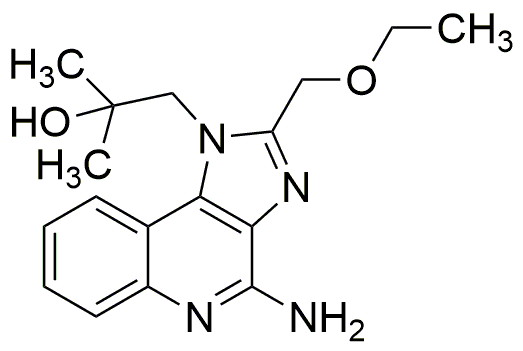Resiquimod is widely utilized in research focused on:
- Topical Immunotherapy: It is used in creams for treating skin conditions like actinic keratosis and superficial basal cell carcinoma, enhancing local immune response.
- Vaccine Adjuvant: Resiquimod acts as an adjuvant in vaccines, improving the effectiveness of the immune response against various pathogens.
- Antiviral Applications: It shows promise in treating viral infections, particularly in enhancing the immune system's ability to combat viruses like HPV.
- Research in Oncology: Its immunomodulatory properties are being explored in cancer therapies, potentially improving outcomes by stimulating immune activity against tumors.
- Dermatological Research: Used in studies to understand skin immune responses and develop new treatments for inflammatory skin diseases.
General Information
Properties
Safety and Regulations
Applications
Resiquimod is widely utilized in research focused on:
- Topical Immunotherapy: It is used in creams for treating skin conditions like actinic keratosis and superficial basal cell carcinoma, enhancing local immune response.
- Vaccine Adjuvant: Resiquimod acts as an adjuvant in vaccines, improving the effectiveness of the immune response against various pathogens.
- Antiviral Applications: It shows promise in treating viral infections, particularly in enhancing the immune system's ability to combat viruses like HPV.
- Research in Oncology: Its immunomodulatory properties are being explored in cancer therapies, potentially improving outcomes by stimulating immune activity against tumors.
- Dermatological Research: Used in studies to understand skin immune responses and develop new treatments for inflammatory skin diseases.
Documents
Safety Data Sheets (SDS)
The SDS provides comprehensive safety information on handling, storage, and disposal of the product.
Product Specification (PS)
The PS provides a comprehensive breakdown of the product’s properties, including chemical composition, physical state, purity, and storage requirements. It also details acceptable quality ranges and the product's intended applications.
Certificates of Analysis (COA)
Search for Certificates of Analysis (COA) by entering the products Lot Number. Lot and Batch Numbers can be found on a product’s label following the words ‘Lot’ or ‘Batch’.
*Catalog Number
*Lot Number
Certificates Of Origin (COO)
This COO confirms the country where the product was manufactured, and also details the materials and components used in it and whether it is derived from natural, synthetic, or other specific sources. This certificate may be required for customs, trade, and regulatory compliance.
*Catalog Number
*Lot Number
Safety Data Sheets (SDS)
The SDS provides comprehensive safety information on handling, storage, and disposal of the product.
DownloadProduct Specification (PS)
The PS provides a comprehensive breakdown of the product’s properties, including chemical composition, physical state, purity, and storage requirements. It also details acceptable quality ranges and the product's intended applications.
DownloadCertificates of Analysis (COA)
Search for Certificates of Analysis (COA) by entering the products Lot Number. Lot and Batch Numbers can be found on a product’s label following the words ‘Lot’ or ‘Batch’.
*Catalog Number
*Lot Number
Certificates Of Origin (COO)
This COO confirms the country where the product was manufactured, and also details the materials and components used in it and whether it is derived from natural, synthetic, or other specific sources. This certificate may be required for customs, trade, and regulatory compliance.


